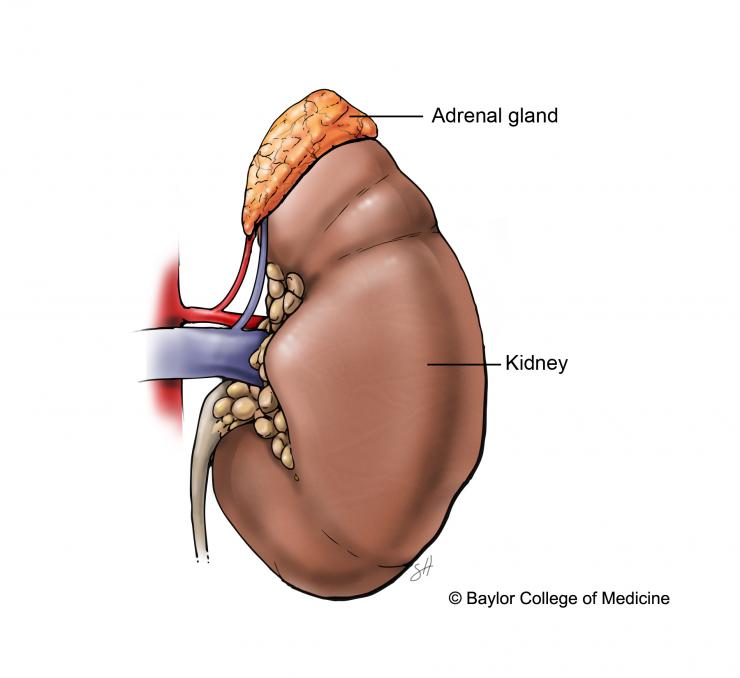The adrenal glands produce several hormones necessary for everyday human life and health. They produce hormones that help regulate the metabolism, blood pressure, immune system, stress response, and many other functions.
The adrenal glands are small triangular glands located at the top of the kidneys.
Addison’s Disease (Primary Adrenal Insufficiency)
Addison's disease occurs when the adrenal glands do not produce enough hormones due to either the adrenal cortex not producing enough cortisol and aldosterone or when both adrenal glands have been surgically removed.
Signs and symptoms of adrenal insufficiency include:
- Unexplained weight loss
- Weakness
- Fatigue
- Salt craving
- Loss of appetite
- Abdominal pain
- Depression
- Dizziness upon standing
Adrenal Nodules (Asymptomatic or Incidental)
Sometimes adrenal nodules show up on an imaging scan (CT scan or MRI) done for an unrelated medical condition. This is a relatively common finding occurring in as many as 10% of all abdominal imaging studies and is known as an asymptomatic or incidental adrenal nodule. Fortunately, most incidental adrenal nodules do not cause health problems. However, the adrenal nodule requires evaluation for possible excess hormone production or suspicion of cancer.
Pheochromocytoma
A pheochromocytoma is a tumor that produces adrenaline. Adrenaline is commonly associated with the "flight or fight" response. It most commonly originates from cells in the adrenal gland, but can, in rare cases, originate from nodules outside the adrenal gland called paragangliomas.
Signs and symptoms of pheochromocytoma may include:
- High blood pressure
- Headache
- Flushing
- Heart palpitations
Treatment for pheochromocytoma involves blood pressure medications followed by surgery, usually laparoscopic (minimally invasive) removal of one or both adrenal glands.
Primary Adrenal Cushing’s Syndrome
Cushing’s syndrome is a condition caused by the adrenal gland producing too much cortisol, a steroid hormone. It is curable with surgery.
Signs and symptoms of Cushing’s syndrome include:
- Unexplained weight gain in the face, abdomen (belly), and upper back
- A loss of fat from legs and arms
- High blood pressure, elevated blood glucose levels (early or full-blown diabetes)
- Reddish-purple streaks or stretch marks on the skin
Primary Hyperaldosteronism (Conn’s Syndrome or Primary Aldosteronism)
Primary hyperaldosteronism occurs when the adrenal gland produces too much of the steroid hormone aldosterone, which helps to control blood pressure. Primary hyperaldosteronism usually results in high blood pressure and potassium deficiency. It is more common in women than in men, and it typically occurs in people aged 30 to 50 years.
Treatment for primary hyperaldosteronism is determined based on the underlying cause of the disease. The majority of cases are caused by the swelling and enlargement of the adrenal glands leading to the overproduction of aldosterone. If only one adrenal gland is affected, surgery can cure the hypertension. If both adrenal glands produce too much aldosterone, then medication is the treatment of choice. Rare cases are caused by a genetic disorder called familial hyperaldosteronism.
Adrenocortical Carcinoma
Adrenocortical carcinoma is a very rare cancer, occurring in one per one million people. Usually, it presents with no apparent signs or symptoms, unless the adrenal glands are producing excessive hormones (such as cortisol and aldosterone). This cancer can be aggressive, spread quickly, and it is difficult to detect.
Isolated Adrenal Metastases
Isolated Adrenal Metastases are cancers that spread from other parts of the body (the breast, lung, or skin) to the adrenal gland. Systemic treatment with chemotherapy is usually recommended for this kind of metastatic cancer, but if the adrenal gland is the only spread site (isolated adrenal metastases), then surgical removal with laparoscopic adrenalectomy is usually an option.








 Credit
Credit
